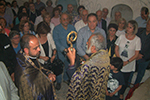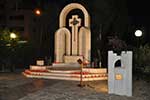Η Στήλη του Σασσουνιαν

WILL POPE FRANCIS REPEAT CARDINAL BERGOGLIO’S WORDS ON THE GENOCIDE?
Shortly after Cardinal Jorge Mario Bergoglio became Pope Francis I, Armenian and Turkish media outlets rushed to inform their audiences that the Argentinean Archbishop had acknowledged the Armenian Genocide on a number of occasions.
When Catholicos Karekin II visited Buenos Aires on April 23, 2004, Cardinal Bergoglio joined him in an ecumenical liturgy and spoke during the commemoration of the victims of the Armenian Genocide. The Cardinal stated: "We are united in grief over a genocide -- the first of the 20th century -- a genocide that powerful empires seek to silence and cover up by all means."
Last week, in his congratulatory letter to Pope Francis I, Karekin II "fondly remembered" their joint meetings and prayers in Argentina, and praised the Catholic Pontiff "as a courageous, wise, and righteous shepherd." The Catholicos recalled Cardinal Bergoglio’s "sincere affection toward the Armenian people," adding: "We gladly confirm that the historical relationship between our churches is marked by fraternal warmth. We greatly value the progress registered by our churches as a result of collaborative efforts undertaken during the pontificates of ourselves and our predecessors. This has been manifested during mutual visits and elaborated through a multitude of educational and charitable programs."
On April 22, 2006, during a program commemorating the 91st anniversary of the Armenian Genocide in Buenos Aires, Cardinal Bergoglio urged Turkey to unconditionally recognize the Armenian Genocide as the "gravest crime of Ottoman Turkey against the Armenian people and the entire humanity."
More recently, in 2011, after an Argentinean Federal Court found Turkey guilty of committing genocide against Armenians in response to a lawsui t filed by survivor Krikor Hairabedian, Cardinal Bergoglio issued a statement condemning "the abominable crime of genocide that the Turkish state committed against the Armenian people between 1915 and 1923."
Both Armenians and Turks are now wondering if in his new capacity Pope Francis I will repeat the words he uttered as Cardinal Bergoglio. Armenians are delighted that a close friend of their community in Argentina has been elected to lead the Catholic Church. Meanwhile, the Turkish press has expressed great concern that "the new Pope could be influenced by [Armenian] lobbying groups."
Now that he has ascended to the highest office of the Roman Church, no one really knows what position Pope Francis would take on Armenian issues. One must remember that the Pontiff has two distinct functions as head of the Catholic Church and the sovereign city-state of Vatican. In other words, he is both a spiritual leader and head of state. Hence, depending on the issue, he may not necessarily express the views he held as Cardinal Bergoglio. At times, he may assume positions on political matters that diverge from his personal views and coincide with Vatican’s more worldly interests. As head of the Vatican state, the Pope may be forced to act as any other politician, such as Pres. Obama, who said one thing before the election and changed his tune afterward. However, as the spiritual leader of the Catholic Church and a man of strong moral values, the Pope cannot simply ignore or contradict his deeply held convictions.
Realizing that all Popes are not alike, it may be useful to review recent papal pronouncements on the Armenian Genocide. Pope John Paul II, on two occasions, used the term Armeni an Genocide -- on November 9, 2000 and September 27, 2001. However, unlike his predecessor, Pope Benedict XVI refrained from using that term, preferring to qualify the Genocide as "martyrdom" and "unspeakable suffering."
In the case of Pope Francis I, there is no need for Armenians to insist that he use the term Armenian Genocide; as the Vatican has twice acknowledged the Armenian Genocide. Thus, no purpose is served by demanding that every new Pope reaffirm the facts of the Armenian Genocide all over again. It is important, however, that Pope Francis I not retreat from his earlier position on the Armenian Genocide; substitutes and euphemisms would not be appropriate.
Given the Vatican’s positive record on the Armenian Genocide, it would be best to go beyond this issue and look for other areas in which the Pontiff could be supportive, such as pressing for the security of Armenians and other Christians in Syria. Efforts should also be made to strengthen the existing amicable ties between the Armenian Apostolic and Catholic churches, and friendly relations between the Vatican State and the Republic of Armenia.
By Harut Sassounian
Publisher, The California Courier




















